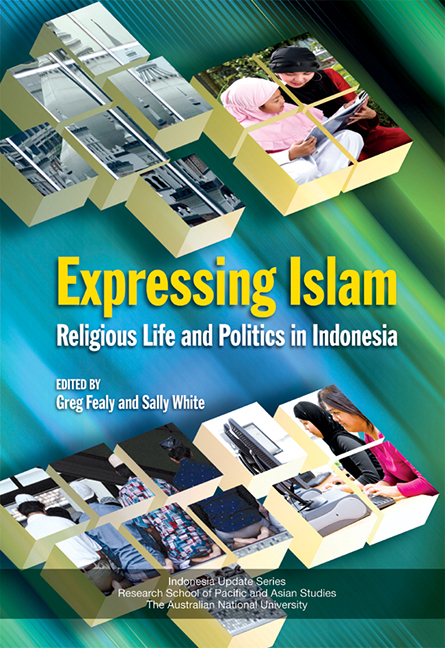Book contents
- Frontmatter
- Contents
- List of Figures and Tables
- List of Contributors
- Acknowledgments
- Glossary
- Map
- 1 Introduction
- PART I EXPRESSING PERSONAL PIETY
- PART II POLITICAL, SOCIAL AND LEGAL EXPRESSIONS OF ISLAM
- 7 Religion, Politics and Social Dynamics in Java: Historical and Contemporary Rhymes
- 8 Islam and Gender in Contemporary Indonesia: Public Discourses on Duties, Rights and Morality
- 9 Online Fatwa in Indonesia: From Fatwa Shopping to Googling a Kiai
- 10 Regional Sharia Regulations in Indonesia: Anomaly or Symptom?
- 11 ‘As Long as It's Halal’: Islamic Preman in Jakarta
- 12 Indonesian Terrorism: From Jihad to Dakwah?
- PART III THE ISLAMIC ECONOMY
- Index
- Indonesia Update Series
- Plate section
8 - Islam and Gender in Contemporary Indonesia: Public Discourses on Duties, Rights and Morality
from PART II - POLITICAL, SOCIAL AND LEGAL EXPRESSIONS OF ISLAM
Published online by Cambridge University Press: 21 October 2015
- Frontmatter
- Contents
- List of Figures and Tables
- List of Contributors
- Acknowledgments
- Glossary
- Map
- 1 Introduction
- PART I EXPRESSING PERSONAL PIETY
- PART II POLITICAL, SOCIAL AND LEGAL EXPRESSIONS OF ISLAM
- 7 Religion, Politics and Social Dynamics in Java: Historical and Contemporary Rhymes
- 8 Islam and Gender in Contemporary Indonesia: Public Discourses on Duties, Rights and Morality
- 9 Online Fatwa in Indonesia: From Fatwa Shopping to Googling a Kiai
- 10 Regional Sharia Regulations in Indonesia: Anomaly or Symptom?
- 11 ‘As Long as It's Halal’: Islamic Preman in Jakarta
- 12 Indonesian Terrorism: From Jihad to Dakwah?
- PART III THE ISLAMIC ECONOMY
- Index
- Indonesia Update Series
- Plate section
Summary
Since the fall of the Soeharto regime in 1998, the political and ideological landscape has changed dramatically for Indonesian women. During the New Order, public discourse on gender focused on a woman's role as wife and mother, and on the contribution women were expected to make to the development of the nation. The principle of equality between men and women was enshrined in the 1945 Constitution. Nevertheless, there was relatively little discussion of women's rights; the focus was on a woman's obligations to her husband, her family and the state (Blackburn 1999). The New Order government downplayed gender issues, despite ratifying the United Nations Convention on the Elimination of All Forms of Discrimination Against Women (CEDAW) in 1984 and signing the Beijing Declaration and Platform for Action in 1995.
The rise of cultural Islam in the 1980s, with its emphasis on Qur'aninspired ideals such as equality and social justice, and of several NGOs dedicated to advocacy on Muslim gender issues in the 1990s, began to influence Muslim thinking on women's rights issues. But it was not until the reformasi period, when the state's tight watch on all matters to do with religion, ethnicity and public discourse in general was relaxed, that gender issues come to the fore. Major factors influencing the increased attention given to gender issues included the growth of Muslim radicalism, the rise of activism based on women's rights, the spread of democratic principles, and the implementation of regional autonomy with its decentralisation of political power.
The first indication of the extent to which gender would be a significant site of contestation in the reformasi period came in 1999, when Megawati Sukarnoputri was the front-running presidential candidate in the first post-Soeharto election campaign (Platzdasch 2000; van Doorn Harder 2002). The questioning of her suitability to rule this Muslim-majority nation, not because of her ability but because of her gender, and the strength of the passion on both sides of the debate, took observers by surprise. It also demonstrated the way in which gender could become a factor in a larger political game. It was clear in 1999, and it is even clearer now, that not all those who opposed Megawati's presidency did so on ideological or religious grounds.
- Type
- Chapter
- Information
- Expressing IslamReligious Life and Politics in Indonesia, pp. 137 - 158Publisher: ISEAS–Yusof Ishak InstitutePrint publication year: 2008



